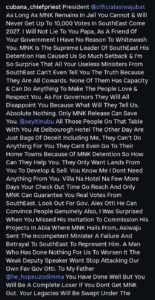Socialite and nightlife promoter, Cubana Chief Priest, has issued a pointed warning to President Bola Ahmed Tinubu, stating that the ruling party risks suffering a major electoral setback in the South-East if detained IPOB leader, Mazi Nnamdi Kanu, is not released before the 2027 general elections. His comments follow the recent life-imprisonment sentence handed down to Kanu by a Federal High Court in Abuja, a judgment that has sparked intense reactions across the region. Eyes Of Lagos reports,
In a lengthy online statement, the businessman argued that the continued incarceration of the separatist leader has generated deep resentment in the region, a sentiment he believes could significantly erode support for the current administration. He claimed that the level of anger among residents has reached a point where the president might struggle to secure even a modest number of votes.
Cubana Chief Priest criticised ministers from the South-East, alleging that many of them have failed to communicate the extent of public dissatisfaction to the presidency. He questioned their ability to galvanise grassroots support and insisted that most political actors presenting themselves as influential are incapable of delivering meaningful backing for the government.
He also faulted some advisers within the administration, saying they had misled the president into believing that political loyalty in the region could be secured without addressing Nnamdi Kanu’s detention. According to him, the symbolic weight Kanu carries among South-East residents cannot be underestimated, and any attempt to win the region politically must first address the lingering grievances tied to the IPOB leader’s incarceration.
He further urged the president to strengthen his relationship with individuals he described as credible regional leaders. Citing Abia State Governor Alex Otti as an example, he argued that Otti holds significant influence and could help stabilise the government’s presence in the region. He recalled that President Tinubu was noticeably absent during the commissioning of major projects in Abia earlier in the year, an absence he described as a missed opportunity for bridge-building.
Cubana Chief Priest also addressed Imo State Governor Hope Uzodimma directly, warning that his legacy could be overshadowed if he fails to intervene meaningfully on the matter. He stated that despite Uzodimma’s achievements, the recent developments surrounding Kanu’s sentencing could politically overwhelm any gains made by the state government.
He claimed that the ruling party must appeal the judgment or risk alienating an entire region ahead of the 2027 polls. According to him, only the release of Nnamdi Kanu can restore confidence and give the administration a realistic path to electoral success.
In his strongly worded message, he urged President Tinubu to dismiss advisers who have downplayed the importance of Kanu’s case, insisting that many of them lack true influence and are concerned only with personal benefits. He argued that several individuals who surround the president cannot return to their home communities because of the hostility triggered by Kanu’s imprisonment, yet they continue to provide political counsel.
In his statement, he wrote that unless urgent action is taken to reverse Kanu’s conviction and restore his freedom, the president should be prepared for a disappointing outcome in the region during the next election cycle. He described Kanu as the “supreme leader of the South-East,” insisting that the political climate cannot be stabilised without addressing his continued detention.
The remarks have triggered widespread discussions online, with many users debating the extent of Kanu’s political influence and the potential impact of his imprisonment on the 2027 presidential election. While supporters echo Cubana Chief Priest’s concerns, critics argue that electoral decisions should not be tied to the fate of one individual.
The presidency has yet to issue an official response to the comments, and political observers say the matter may continue to shape regional discourse in the coming months.

